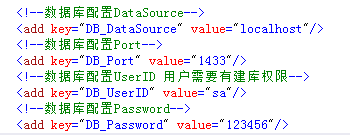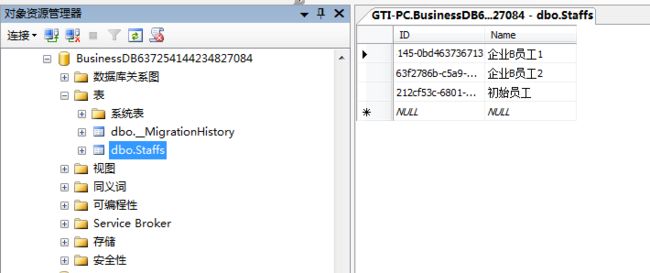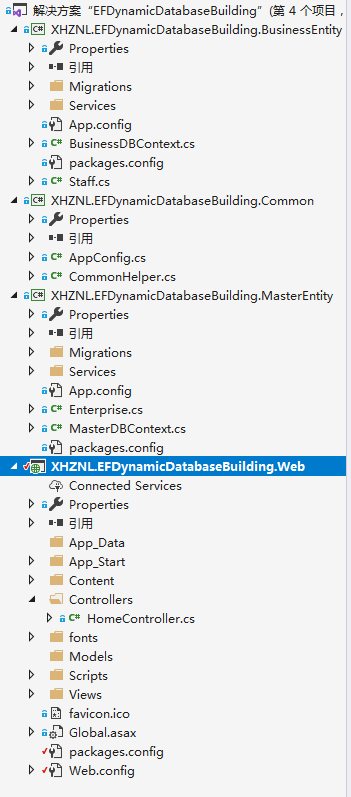一、前言
公司原本有一个“xx系统”,ORM使用EntityFramework,Code First模式。该系统是针对某个客户企业的,现要求该系统支持多个企业使用,但是又不能给每个企业部署一份(难以维护),只能想办法从代码层面去解决这个问题。
二、思路
- 在原有的数据表增加外键,标记该数据属于哪个企业。这代码改动会非常大,之前的查询修改代码都需要增加外键筛选的逻辑。这显然不合理。
- 动态分库。每个企业注册时,为他生成一个独立的数据库,企业登录时切换到他对应的数据库。这样就完全不用修改以前的业务代码,只需要考虑企业数据库切换的问题。
三、实现
那么EntityFramework Code First模式怎么实现动态分库的功能呢?
- 首先建立一个主库,主库只存放企业用户的数据,包括企业登录名,密码,对应的数据库名 等等... 主库只有一个。
- 业务数据库,在企业注册的时候动态创建,业务数据库可以有多个,也可以放到不同的服务器。
- 企业登录时,读取主库,拿到业务数据库名称,然后保存到用户session中(也可以是别的缓存),该用户的后续请求都基于此数据库。
主库模型放在XHZNL.EFDynamicDatabaseBuilding.MasterEntity里面,主库只有一个企业表:Enterprise:
using System;
using System.Collections.Generic;
using System.ComponentModel.DataAnnotations;
using System.ComponentModel.DataAnnotations.Schema;
using System.Linq;
using System.Text;
using System.Threading.Tasks;
namespace XHZNL.EFDynamicDatabaseBuilding.MasterEntity
{
///
/// 企业
///
public class Enterprise
{
///
/// ID
///
[Required]
public Guid ID { get; set; }
///
/// 企业名称
///
[Required]
[Column(TypeName = "NVARCHAR")]
[MaxLength(50)]
public string Name { get; set; }
///
/// 企业数据库名称
///
[Required]
[Column(TypeName = "NVARCHAR")]
[MaxLength(100)]
public string DBName { get; set; }
///
/// 企业 账号
///
[Required]
[Column(TypeName = "NVARCHAR")]
[MaxLength(20)]
public string AdminAccount { get; set; }
///
/// 企业 密码
///
[Required]
[Column(TypeName = "NVARCHAR")]
[MaxLength(50)]
public string AdminPassword { get; set; }
}
}
XHZNL.EFDynamicDatabaseBuilding.MasterEntity.Services.BaseService:
using System;
using System.Collections.Generic;
using System.Data.Entity;
using System.Linq;
using System.Text;
using System.Threading.Tasks;
using XHZNL.EFDynamicDatabaseBuilding.Common;
namespace XHZNL.EFDynamicDatabaseBuilding.MasterEntity.Services
{
public class BaseService
{
///
/// 获取context
///
/// (true);
dbInitializer.InitializeDatabase(context);
}
if (!context.Database.CompatibleWithModel(false))
{
var dbInitializer = new MigrateDatabaseToLatestVersion(true);
dbInitializer.InitializeDatabase(context);
}
return context;
}
catch (Exception ex)
{
return null;
}
}
}
}
XHZNL.EFDynamicDatabaseBuilding.MasterEntity.Services.EnterpriseService:
using System;
using System.Collections.Generic;
using System.Linq;
using System.Text;
using System.Threading.Tasks;
using XHZNL.EFDynamicDatabaseBuilding.Common;
namespace XHZNL.EFDynamicDatabaseBuilding.MasterEntity.Services
{
///
/// 企业服务
///
public class EnterpriseService : BaseService
{
public static readonly EnterpriseService Instance = new EnterpriseService();
private EnterpriseService() { }
///
/// 根据账号密码 获取 企业
///
///
///
///
/// 添加企业
///
///
/// XHZNL.EFDynamicDatabaseBuilding.Common.CommonHelper:
using System;
using System.Collections.Generic;
using System.Linq;
using System.Runtime.Remoting.Messaging;
using System.Text;
using System.Threading.Tasks;
namespace XHZNL.EFDynamicDatabaseBuilding.Common
{
public class CommonHelper
{
public static readonly CommonHelper Instance = new CommonHelper();
private CommonHelper() { }
///
/// 获取当前数据库
///
///
/// 设置当前数据库
///
///
public void SetCurrentDBName(string name)
{
var key = "CurrentDBName";
if (System.Web.HttpContext.Current != null && System.Web.HttpContext.Current.Session != null)
{
System.Web.HttpContext.Current.Session[key] = name;
}
else
{
CallContext.SetData(key, name);
}
}
}
}
web.config配置一下业务数据库的连接信息:

这个可以根据实际业务修改,分布到不同的服务器,这里只是为了演示。
业务数据库模型放在XHZNL.EFDynamicDatabaseBuilding.BusinessEntity里面,这里只有一个员工表
using System;
using System.Collections.Generic;
using System.ComponentModel.DataAnnotations;
using System.ComponentModel.DataAnnotations.Schema;
using System.Linq;
using System.Text;
using System.Threading.Tasks;
namespace XHZNL.EFDynamicDatabaseBuilding.BusinessEntity
{
///
/// 员工
///
public class Staff
{
///
/// ID
///
[Required]
public Guid ID { get; set; }
///
/// 员工名称
///
[Required]
[Column(TypeName = "NVARCHAR")]
[MaxLength(50)]
public string Name { get; set; }
}
}
数据库context:
using System;
using System.Collections.Generic;
using System.Data.Entity;
using System.Linq;
using System.Text;
using System.Threading.Tasks;
namespace XHZNL.EFDynamicDatabaseBuilding.BusinessEntity
{
//[DbConfigurationType(typeof(MySql.Data.Entity.MySqlEFConfiguration))]//使用mysql时需要这个
internal class BusinessDBContext : DbContext
{
public BusinessDBContext() : base("name=BusinessDB")
{
Database.SetInitializer(null);
}
//修改上下文默认构造函数
public BusinessDBContext(string connectionString)
: base(connectionString)
{
}
///
/// 员工
///
public DbSet Staffs { get; set; }
}
}
XHZNL.EFDynamicDatabaseBuilding.BusinessEntity.Migrations.Configuration:可以放一些种子数据...
namespace XHZNL.EFDynamicDatabaseBuilding.BusinessEntity.Migrations
{
using System;
using System.Data.Entity;
using System.Data.Entity.Migrations;
using System.Linq;
internal sealed class Configuration : DbMigrationsConfiguration
{
public Configuration()
{
AutomaticMigrationsEnabled = true;
AutomaticMigrationDataLossAllowed = true;
//SetSqlGenerator("MySql.Data.MySqlClient", new MySql.Data.Entity.MySqlMigrationSqlGenerator());//使用mysql时需要这个
}
protected override void Seed(XHZNL.EFDynamicDatabaseBuilding.BusinessEntity.BusinessDBContext context)
{
// This method will be called after migrating to the latest version.
// You can use the DbSet.AddOrUpdate() helper extension method
// to avoid creating duplicate seed data.
var staff = new Staff() { ID = Guid.Parse("212cf53c-6801-4c00-b36b-996ac9809e04"), Name = "初始员工" };
context.Staffs.AddOrUpdate(staff);
context.SaveChanges();
}
}
}
关键的分库,建库,更新数据库代码在XHZNL.EFDynamicDatabaseBuilding.BusinessEntity.Services.BaseService,任何的模型修改都能在程序运行时自动更新到数据库:
using System;
using System.Collections.Generic;
using System.Data.Entity;
using System.Linq;
using System.Text;
using System.Threading.Tasks;
using XHZNL.EFDynamicDatabaseBuilding.Common;
namespace XHZNL.EFDynamicDatabaseBuilding.BusinessEntity.Services
{
public class BaseService
{
///
/// 获取context
///
/// (true);
dbInitializer.InitializeDatabase(context);
}
//数据库接口是否和模型一致 不一致则更新
if (!context.Database.CompatibleWithModel(false))
{
var dbInitializer = new MigrateDatabaseToLatestVersion(true);
dbInitializer.InitializeDatabase(context);
}
return context;
}
catch (Exception ex)
{
return null;
}
}
}
}
其他的数据访问类继承BaseService,通过GetDBContext()方法获取context,这样确保得到正确的业务数据库。
四、效果
- 运行web项目:

此时数据库中只有一个主库:

- 点击注册企业:


注册2个企业用于测试
此时主库已有了2条企业数据:

- 分别用test1,test2登录,并添加员工数据:




企业登录后已经生成了对应的业务库

- 数据正确添加读取:


五、总结:
以上关于EntityFramework分库的核心就是通过动态构建connectionString,来得到context。至于如何动态构建,方法有很多,以上代码只是最简单的实现。代码在:https://github.com/xiajingren/EFDynamicDatabaseBuilding
